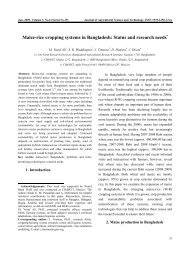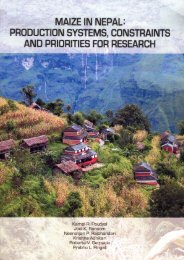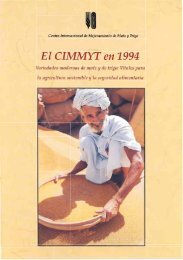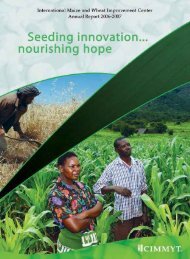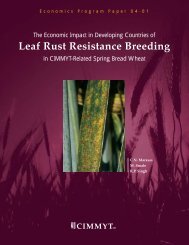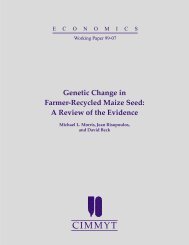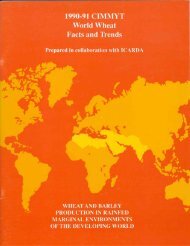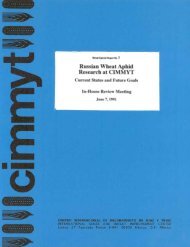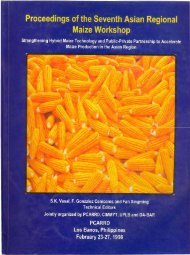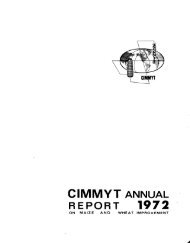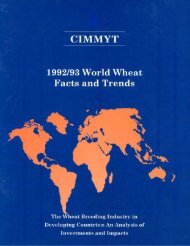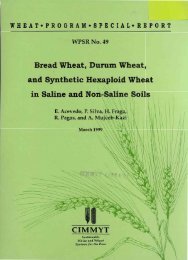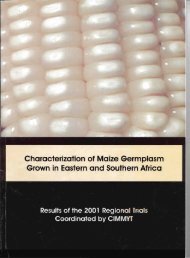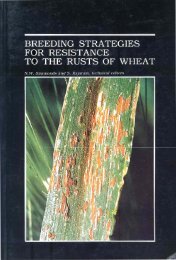Download - Maize
Download - Maize
Download - Maize
Create successful ePaper yourself
Turn your PDF publications into a flip-book with our unique Google optimized e-Paper software.
haploids, and innovative marker‐based approaches designed for quantitative trait improvement.<br />
The latter include marker‐assisted recurrent selection (MARS) and rapid‐cycle genomic selection<br />
(GS) to dramatically shorten breeding cycles and increase rates of yield gain under drought and<br />
nitrogen stress conditions.<br />
5. Tagged alleles with large effects on abiotic stresses, particularly nitrogen, drought, and heat, for use<br />
by public and private breeders in marker‐assisted selection in varieties targeted for stress‐affected<br />
environments. We will forge public–private partnerships for positional cloning and development of<br />
breeder‐ready markers for large‐effect native‐trait alleles for these stresses.<br />
6. Standard operating protocols, procedures and facilities established to phenotype maize germplasm<br />
for resistance to major biotic stresses:<br />
Phenotyping hubs for major biotic stresses developed.<br />
Standardized phenotyping protocols for major biotic stresses of critical importance established<br />
and published.<br />
Well trained support staff capable of generating reliable data available to scientists, NARSs and<br />
seed companies.<br />
7. Molecular markers for the introgression of major genes/QTL conferring resistance to key biotic<br />
stresses will be identified, developed, validated, and deployed:<br />
Gene‐based or tightly linked markers associated with resistance to major biotic stresses<br />
identified and delivered to breeders.<br />
Markers for biotic stress tolerance routinely used to select in segregating generations in DTMA<br />
and related breeding programs.<br />
Genes for biotic stress tolerance introgressed into drought‐tolerant inbred lines.<br />
8. The capacity of NARS and private‐sector scientists to conduct biotic stress screening and develop<br />
multiple disease‐ and insect‐resistant maize germplasm in their breeding programs will be<br />
strengthened.<br />
9. Building on CIMMYT’s current public–private partnerships (Water‐Efficient <strong>Maize</strong> for Africa with the<br />
African Agricultural Technology Foundation and Monsanto, and Improved <strong>Maize</strong> for African Soils<br />
with Pioneer), humanitarian licenses for large‐effect (>10%) transgenic technologies identified and<br />
sourced from private partners, introgressed into improved adapted germplasm, and validated in<br />
confined field testing with national research system partners where the necessary regulatory<br />
frameworks exist. Because of the extremely high cost of transgene development and deregulation,<br />
transgenic approaches will be used when (i) highly promising events are identified in commercial<br />
programs and (ii) partnerships can be formed to leverage the development pipelines and biosafety<br />
and deregulation investments made by major seed companies. MAIZE will also strive to strengthen<br />
close partnerships with selected countries in the developing world to enable establishment of biosafety<br />
authorities and/or facilitating development of appropriate rules and regulations (as per<br />
internationally accepted protocols) to guide field testing of transgenic maize. Support to weaker<br />
national research systems, seed companies, and community‐based organizations to register,<br />
promote, and disseminate stress‐tolerant varieties through:<br />
Production of parental seed stocks in regional foundation seed units to enable rapid scale‐up of<br />
seed production by national research systems, seed companies, and NGOs.<br />
Availability of appropriate product information about improved varieties for demonstrations<br />
and farmer education, so as to create a market demand for the new varieties.<br />
Training in skills and strategies to effectively test, release, scale‐up, and market new varieties.<br />
10. Institutional innovations, seed market information, and policy recommendations that accelerate the<br />
diffusion of stress tolerant maize varieties into areas with a weaker private seed sector presence.<br />
111




